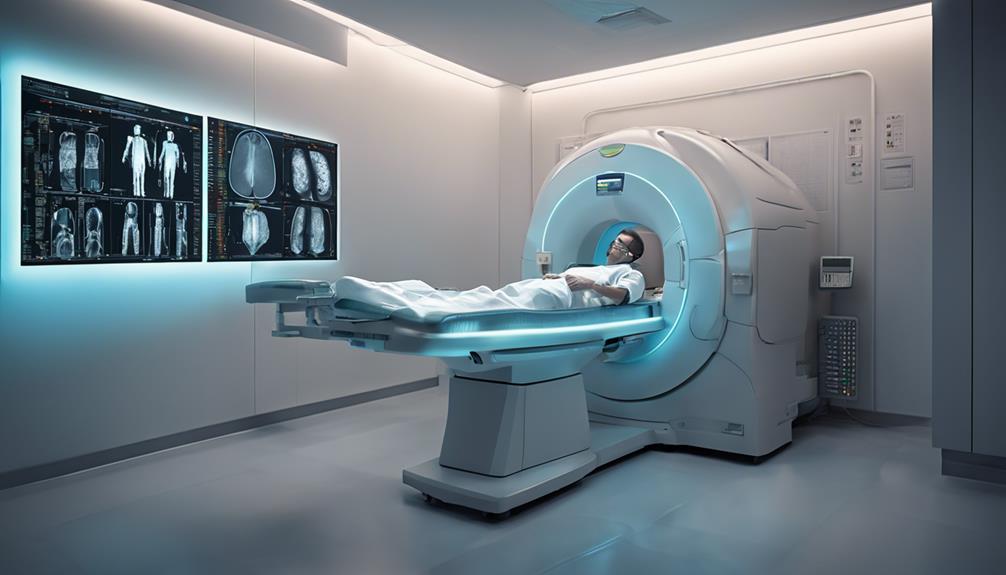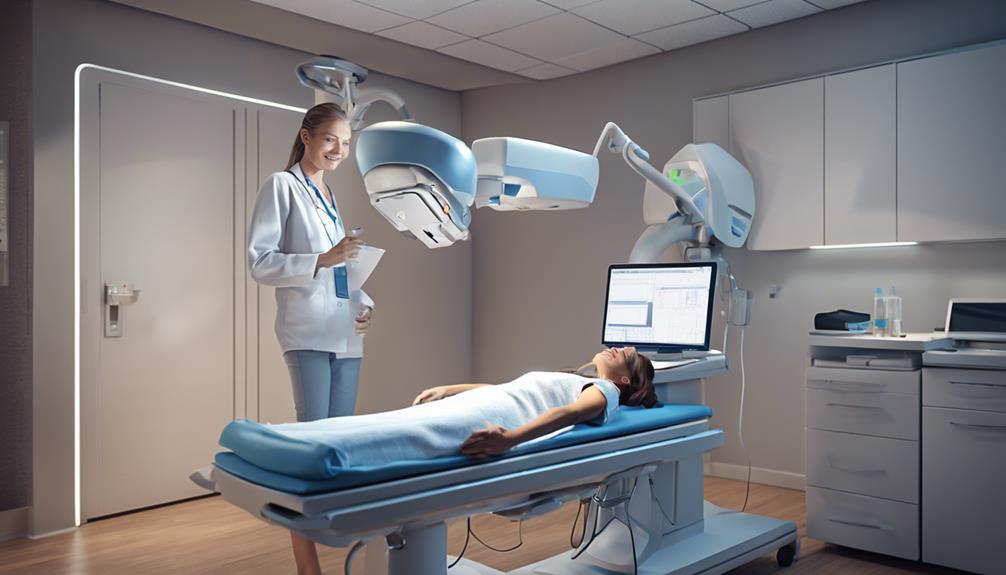
If you're looking for an easy medical job that pays well, becoming a dental hygienist might be your ideal choice. You can enter this field with just an associate degree and quickly start earning a competitive salary. As a dental hygienist, you'll focus on preventive oral healthcare, examining patients for oral diseases and educating them on maintaining good oral health. This career not only offers stability and a satisfying job environment but also allows for flexible scheduling, which promotes a great work-life balance. You're about to uncover even more benefits this role offers.
Exploring Medical Radiologic Technologist

Delving into the role of a Medical Radiologic Technologist, you'll find it's not only accessible but also well-compensated. As you explore this career, you discover it involves much more than just taking X-rays. You're at the forefront of diagnostic imaging, which includes computed tomography (CT), magnetic resonance imaging (MRI), and mammography. These technologies are crucial in diagnosing various medical conditions, making your role pivotal in patient care.
You'll need an associate degree to start, making this field relatively easy to enter compared to other healthcare professions requiring more extensive education. Certification requirements vary by state, but generally, you must pass an exam from the American Registry of Radiologic Technologists (ARRT) to practice.
In terms of compensation, you're looking at a median annual salary that's quite attractive, often ranging from $50,000 to $70,000. This depends on your experience, location, and the specific healthcare facility you work in.
Additionally, your job isn't just rewarding financially; it also offers a chance to significantly impact patient outcomes by providing essential diagnostic information that aids in treatment planning. This blend of technical skill, patient interaction, and critical thinking ensures your days are both challenging and fulfilling.
The Role of a Dental Hygienist
Shifting focus to another accessible and rewarding medical field, consider the role of a dental hygienist. As a dental hygienist, you'll play a crucial role in oral healthcare, primarily focusing on preventive measures. You're responsible for cleaning teeth, examining patients for signs of oral diseases such as gingivitis, and providing other preventive dental care. You'll also educate patients on ways to improve and maintain good oral health.
Typically, you'd need an associate degree in dental hygiene, which you can complete in about two years. This role doesn't just offer a relatively quick entry into the medical field but also provides a comfortable work-life balance, often with flexible scheduling and the option for part-time work.
Your day-to-day tasks would include removing tartar, stains, and plaque from teeth, applying sealants and fluorides to help protect teeth, taking dental x-rays, and assessing patients' oral health and reporting findings to dentists. You'll have direct interaction with patients, advising them on oral health practices, brushing, flossing, and nutritional counseling.
This career not only allows you to help others maintain their health but also offers a stable and satisfying job environment. It's a role where you can truly see the results of your work and the positive impact it has on your patients' lives.
Benefits of Being a Diagnostic Medical Sonographer

Exploring the benefits of being a diagnostic medical sonographer, you'll find this career offers both high job satisfaction and excellent pay. As a sonographer, you'll work closely with physicians and patients, providing vital imaging that aids in diagnosis and treatment planning. This role isn't just about operating equipment; it's about being a key player in a patient's healthcare journey.
You'll enjoy a variety of work environments, from hospitals to private clinics, giving you flexibility and a change of scenery that keeps the job interesting. The demand for sonographers is growing, leading to job security and opportunities for advancement. You're not just confined to one specialty either; you can choose to focus on areas like obstetrics, cardiology, or musculoskeletal sonography, to name a few.
Financially, sonography is a smart choice. With just a two-year associate degree, you can enter a field that offers a median annual salary that rivals that of other healthcare professionals requiring more extensive education. Plus, many sonographers work full-time and receive comprehensive benefits, including health insurance, retirement plans, and paid leave.
This career not only pays well but also provides a satisfying balance of patient interaction and technical expertise, making it an appealing choice for many.
A Look at Occupational Therapy Assistants
Like diagnostic medical sonographers, occupational therapy assistants also enjoy a rewarding career in healthcare with a focus on helping patients regain or improve their daily living skills. As an occupational therapy assistant, you'd work closely under the supervision of occupational therapists to execute treatment plans that help individuals perform daily tasks more independently. This could involve teaching patients exercises to increase their mobility, guiding children with disabilities in various activities that promote skills, or helping older adults adapt to physical challenges.
You'll find that this role not only pays well but also offers a high level of job satisfaction since you're directly improving the quality of life for many. Typically, you'd need an associate degree from an accredited program to start, which can be completed in about two years—quite manageable compared to other healthcare professions requiring more extensive education.
Moreover, the demand for occupational therapy assistants is expected to grow significantly in the coming years, promising job security and opportunities for advancement.
This career path offers a fulfilling blend of patient interaction, creative problem-solving, and active engagement in the therapy process, making it a compelling choice for those passionate about healthcare and helping others.
Understanding Medical Records Technicians

Managing medical records efficiently, medical records technicians play a crucial role in the healthcare system. You might find yourself drawn to this role if you have a knack for organization and an eye for detail.
As a medical records technician, you'd handle and maintain the data integrity of patient information, which is vital for quality patient care. You'd ensure that all records are accurate, up-to-date, and accessible only to authorized personnel. This job requires a strong understanding of both healthcare practices and the technology used to manage data.
You don't need to have a medical degree, but a certificate or associate degree in health information technology is typically necessary. Your daily tasks would include coding diagnoses and procedures for billing and insurance purposes, processing medical records, and safeguarding patient privacy.
You'd work closely with healthcare professionals to clarify any inconsistencies in medical records and ensure compliance with regulations. If you're looking for a stable job that offers a good salary without the extensive training that other healthcare careers might demand, becoming a medical records technician could be a smart choice.
Plus, with the growing focus on digital health records, your skills will be in high demand.
Career Path of a Physical Therapist Assistant
If you're considering a career in healthcare that combines physical activity with patient care, becoming a physical therapist assistant might be the right path for you. This role involves helping patients regain movement and manage pain after injuries or illnesses. It's a hands-on job where you'll work closely under the supervision of a physical therapist.
To start, you'll need an associate's degree from an accredited physical therapist assistant program, which typically takes about two years. These programs cover anatomy, physiology, and clinical procedures. You'll also complete several clinical rotations to gain real-world experience in different settings like hospitals, outpatient clinics, and rehabilitation centers.
After graduating, you'll have to pass the National Physical Therapy Exam (NPTE) for physical therapist assistants to get licensed. Requirements can vary slightly by state, so it's important to check the specific regulations where you plan to work.
Once you're licensed, you can expect to find job opportunities in various healthcare settings. The demand for physical therapist assistants is growing, as the aging population requires more rehabilitative services. It's a rewarding career with a median salary that's quite competitive, offering both personal satisfaction and financial stability.
Frequently Asked Questions
What Medical Job Requires the Least Amount of Schooling?
You're likely seeking a medical job with minimal schooling requirements. Consider becoming a medical assistant or a phlebotomist, as these positions typically require less extensive training while still offering a pathway into the healthcare field.
Can I Work Remotely in Any Easy, Well-Paying Medical Jobs?
You can find remote medical jobs that pay well, like medical coding or telehealth nursing. These positions offer flexibility and good salaries without requiring extensive training compared to other medical roles.
Are There Medical Jobs With Flexible Working Hours?
Yes, you'll find several medical jobs with flexible working hours. Positions like medical scribes, telehealth nurses, and certain healthcare consulting roles often offer the flexibility to set your own schedule.
What Is the Average Retirement Age for These Medical Professions?
You're likely wondering about the average retirement age for medical professions. It typically ranges between 65 and 70, though many choose to retire earlier or later based on personal circumstances and financial stability.
How Does Job Satisfaction Compare in These Easy, High-Paying Medical Roles?
You'll find job satisfaction varies widely among these roles, often influenced by work environment, responsibilities, and personal interests rather than just salary or ease of the job itself. It's important to consider all factors.
Conclusion
You've got options if you're seeking a well-paying medical career that doesn't demand extensive training. Whether it's capturing images as a Medical Radiologic Technologist, cleaning teeth as a Dental Hygienist, or assisting patients as an Occupational Therapy Assistant, each role offers a unique blend of rewards and challenges.
Consider also the technical expertise of a Diagnostic Medical Sonographer or the organizational skills of a Medical Records Technician. Your path to a fulfilling career in healthcare is clearer and closer than you might think.






